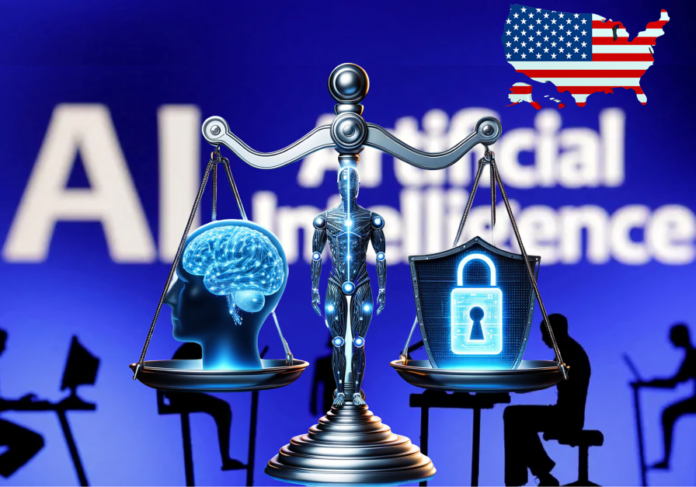The AI Strategy Framework set forth by the United States is an ambitious new plan aimed at securing a competitive advantage in artificial intelligence and setting global standards in the technology sector. By strengthening national AI capabilities, addressing ethical challenges, and prioritizing safety, the strategy aims to position the U.S. as a pioneer in the evolving field of AI, ensuring technological and economic superiority on the global stage.
As AI continues to reshape industries and national economies,the United States’ AI Strategy Framework presents a comprehensive roadmap to establish the nation’s leadership in this crucial area. The framework identifies key objectives to foster innovation, improve international collaboration, and regulate AI applications for maximum societal benefit.
It addresses a broad spectrum of AI-related challenges, from enhancing technical infrastructure to developing a highly skilled workforce capable of managing and advancing AI systems. Furthermore, it emphasizes ethical AI practices to ensure that advancements align with democratic values and promote public trust.
Key Components of the AI Strategy Framework
The AI Strategy Framework outlines several pillars essential for the U.S. to lead in the global AI race. These include:
1. Infrastructure and Research Investments
One of the framework’s cornerstones is significant investment in AI research infrastructure. The plan includes financial support for AI research centers across the country, targeting universities, technology hubs, and private sector organizations. By creating a robust infrastructure, the U.S. aims to accelerate AI advancements and secure a leading position in fundamental AI research and application.
2. Workforce Development and Education
To sustain and expand its AI capabilities, the U.S. strategy emphasizes a strong focus on education and workforce training. Specialized programs in AI, machine learning, and data science will be expanded within academic institutions and professional training programs, equipping individuals with the skills necessary to thrive in AI-related fields. Scholarships, grants, and apprenticeships are among the initiatives aimed at fostering a diverse and highly skilled AI workforce.
3. Ethical AI and Global Standards
As part of its leadership goals, the AI Strategy Framework addresses the importance of ethical AI practices and the development of global standards. The framework proposes collaborations with international organizations to create guidelines that promote transparency, accountability, and fairness in AI systems. These standards are intended to prevent misuse of AI technologies and uphold democratic principles globally.
4. National Security and AI Governance
The framework also prioritizes AI in national security, calling for the development of defense-focused AI applications that safeguard national interests while adhering to ethical norms. The governance of AI systems in sensitive areas, including military and intelligence sectors, is a crucial aspect of the framework. By integrating AI technologies into national defense, the U.S. aims to maintain a strategic edge over potential adversaries.
Collaboration with Private Sector and Global Partners
Collaboration is a central tenet of the U.S. AI Strategy Framework. Recognizing that the private sector drives much of AI innovation, the strategy calls for enhanced partnerships with leading tech companies to foster advancements and streamline regulatory practices. Moreover, the U.S. plans to collaborate with allied nations to create a unified front that supports responsible AI development, paving the way for comprehensive, internationally accepted standards that protect the interests of both developers and the public.
The Role of Public-Private Partnerships
Public-private partnerships play a pivotal role in achieving the framework’s objectives. By joining forces with industry leaders, the U.S. government aims to accelerate the pace of innovation, increase resource allocation for research, and ensure that AI systems are developed in alignment with societal needs and ethical standards. This cooperative approach is designed to boost innovation while maintaining strict regulatory standards.
AI Strategy Framework and Economic Impact
The framework is not solely focused on technology; it also highlights the economic implications of AI dominance. The U.S. aims to harness AI’s potential to boost productivity across various sectors, from healthcare and finance to manufacturing and logistics. By optimizing processes and creating new job categories, the U.S. expects AI-driven economic growth to offset the displacement effects that automation may bring.
AI-Driven Economic Initiatives
In the coming years, AI is expected to drive unprecedented productivity growth, creating numerous jobs in emerging fields such as robotics, automation, and data science. The framework envisions a future where AI integration leads to cost savings and operational efficiencies across industries, enhancing the U.S. economy and increasing competitiveness on a global scale.
Addressing Challenges and Ethical Concerns
While the framework focuses on growth, it also addresses pressing ethical and societal concerns. The document emphasizes AI’s role in promoting democratic values, protecting privacy, and ensuring that AI applications are developed and deployed responsibly. This includes measures to address biases in AI algorithms, protect individual privacy, and mitigate risks associated with autonomous systems.
Privacy and Security in AI
Privacy and security are key priorities in the framework, especially in light of recent debates surrounding data usage and AI surveillance. The framework proposes stringent regulations and oversight mechanisms to ensure that AI technologies are secure and privacy-compliant, particularly in sensitive applications such as healthcare and law enforcement.
Future Outlook and U.S. Vision for AI Leadership
The U.S. AI Strategy Framework represents a monumental step towards securing the nation’s position as a leader in the global AI race. By combining a focus on infrastructure, research, workforce development, ethics, and international collaboration, the framework aims to create a thriving AI ecosystem that not only benefits the U.S. but also contributes to global stability and progress. As the world enters a new era of AI-powered transformations, the U.S. strategy is poised to shape the trajectory of AI technology for years to come.
The AI Strategy Framework positions the United States at the forefront of global AI innovation by combining robust research, ethical standards, and strong collaborations with both the private sector and international partners. As the U.S. moves forward with this comprehensive strategy, its focus on ethical considerations, economic impacts, and national security underscores a balanced approach aimed at harnessing AI’s potential for societal benefit and global leadership.


